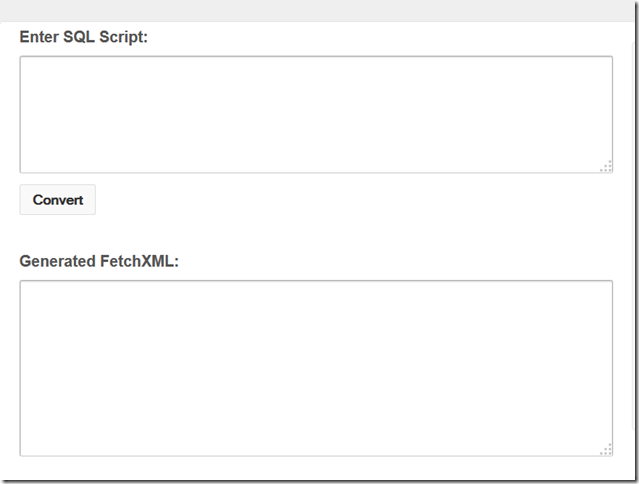Dynamic CRM 2013学习笔记(九)CrmFetchKit.js介绍:Fetchxml、多表联合查询, 批量更新
CrmFetchKit.js是一个跨浏览器的一个类库,允许通过JavaScript来执行fetch xml的查询,还可以实现批量更新,分页查询等。目前已支持Chrome 25, Firefox 19 和 IE9/10 .
它的最大优势是可以通过fetchxml 来查询,这样我们就可以实现真正的多表联合查询,虽然可以用OData终结点的$expand来进行多表的联合查询,但这种方式没办法过滤多表的条件,它只能过滤主表的条件。
下面来看下简单的多表查询的例子:
1.首先定义一个fetchxml:
1: var fetchxml = ['<fetch version="1.0" output-format="xml-platform" ',2: 'mapping="logical" ',3: 'returntotalrecordcount="true" >',4: '<entity name="new_floor_price">',5: '<attribute name="new_floor_priceid" />',6: '<order attribute="modifiedon" descending="true" />',7: '<filter type="and">',8: '<condition attribute="new_approval_status" operator="eq" value="3" />',9: '</filter>',10: '<link-entity name="new_fp_item" from="new_fp" to="new_floor_priceid" alias="ar">',11: '<attribute name="new_floor_price" />',12: '<filter type="and">',13: '<condition attribute="new_modelid" operator="eq" value="' + modelid + '" />',14: '</filter>',15: '</link-entity>',16: '</entity>',17: '</fetch>'].join('');
我一般先写好sql语句,然后在 http://sql2fetchxml.com/ 这里生成fetchxml 语句,再小改下参数就成了。
在上面的框里输入SQL 语句,点击 中间的Convert,就可以在下面的框里生成 Fetchxml的语句。
2. 调用很简单:
1: CrmFetchKit.Fetch(fetchxml).then(function (results) {2: if(results!=null)3: setAttributeValue("new_floor_price", Number(results[0].getValue("ar.new_floor_price")));4: }, onFetchError);
3. 错误处理:
1: function onFetchError(xhr, status, errorThrown) {2:3: var errormsg = $(xhr.responseXML).find('Message').text();4:5: alert('CrmFetchKit-Error occured: ' + errormsg);6: }
4. 另一种写法:
1: // execute the query (async)2: CrmFetchKit.Fetch(fetchxml)3: .fail(function(xhr, status, errorThrown){4:5: // get the error-message6: var msg = $(xhr.responseXML).find('Message').text();7:8: alert('Error occured: ' + msg);9: })10: .done(function(results){11:12: var contactid = null;13:14: for( var i = 0, max = results.length; i < max; i++) {15:16: contactid = results[i].getValue('contactid');17:18: // Assign (async)19: CrmFetchKit.Assign(contactid, 'contact', bId);20: }21: });这个示例中,还介绍了CrmFetchKit.Assign的用法
CrmFetchKit.Assign(contactid, 'contact', bId);这样就可以实现批量更新了
5. FetchMore 用法
1: var fetchxml = ['<fetch version="1.0" output-format="xml-platform" ',2: 'mapping="logical" ',3: 'returntotalrecordcount="true" ',4: 'count="10">',5: ' <entity name="contact">',6: ' <attribute name="lastname" />',7: ' <attribute name="contactid" />',8: ' <filter type="and">',9: ' <condition attribute="lastname" operator="like" value="test%" />',10: ' </filter>',11: ' </entity>',12: '</fetch>'].join('');13:14: CrmFetchKit.FetchMore(fetchxml).then(function (response) {15:16: // 获取实体名17: var entityname = response.entityName;18:19: // fetchxml里必须设置 'returntotalrecordcount="true" '20: var total = response.moreRecords;21:22: // 取得实体的数组23: var set = response.entities;24:25: // 分页就需要这个 page-cookie26: var pageCookie = response.pagingCookie;27:28: ...29:30: }, onFetchError);
6. FetchAll用法:
1: var fetchxml = ['<fetch version="1.0" output-format="xml-platform" ',2: 'mapping="logical" ',3: 'count="10">',4: ' <entity name="contact">',5: ' <attribute name="lastname" />',6: ' <attribute name="contactid" />',7: ' <filter type="and">',8: ' <condition attribute="lastname" operator="like" value="test%" />',9: ' </filter>',10: ' </entity>',11: '</fetch>'].join('');12:13: CrmFetchKit.FetchAll(fetchxml).then(function (entities) {14:15: /* success-handler */16:17: }, onFetchError);
7. 下载地址
注意事项:
1. 要注意全部是小写
2. 给lookup赋值时,要注意lookup类型是正确的
如果您觉得阅读本文对您有帮助,请点一下“推荐”按钮,您的“推荐”将是我最大的写作动力!欢迎各位转载,但必须在文章页面明显位置给出作者和原文连接,否则保留追究法律责任的权利。
分类:
CRM






【推荐】国内首个AI IDE,深度理解中文开发场景,立即下载体验Trae
【推荐】编程新体验,更懂你的AI,立即体验豆包MarsCode编程助手
【推荐】抖音旗下AI助手豆包,你的智能百科全书,全免费不限次数
【推荐】轻量又高性能的 SSH 工具 IShell:AI 加持,快人一步
· go语言实现终端里的倒计时
· 如何编写易于单元测试的代码
· 10年+ .NET Coder 心语,封装的思维:从隐藏、稳定开始理解其本质意义
· .NET Core 中如何实现缓存的预热?
· 从 HTTP 原因短语缺失研究 HTTP/2 和 HTTP/3 的设计差异
· 周边上新:园子的第一款马克杯温暖上架
· Open-Sora 2.0 重磅开源!
· 分享 3 个 .NET 开源的文件压缩处理库,助力快速实现文件压缩解压功能!
· Ollama——大语言模型本地部署的极速利器
· DeepSeek如何颠覆传统软件测试?测试工程师会被淘汰吗?